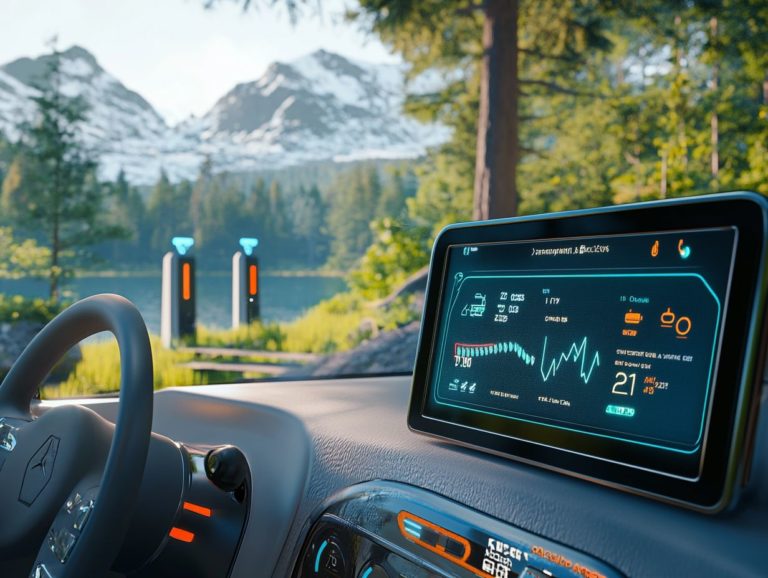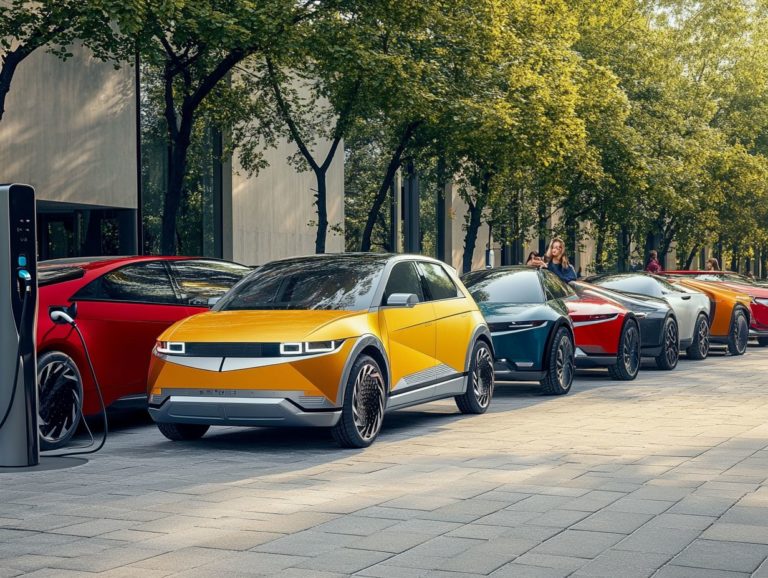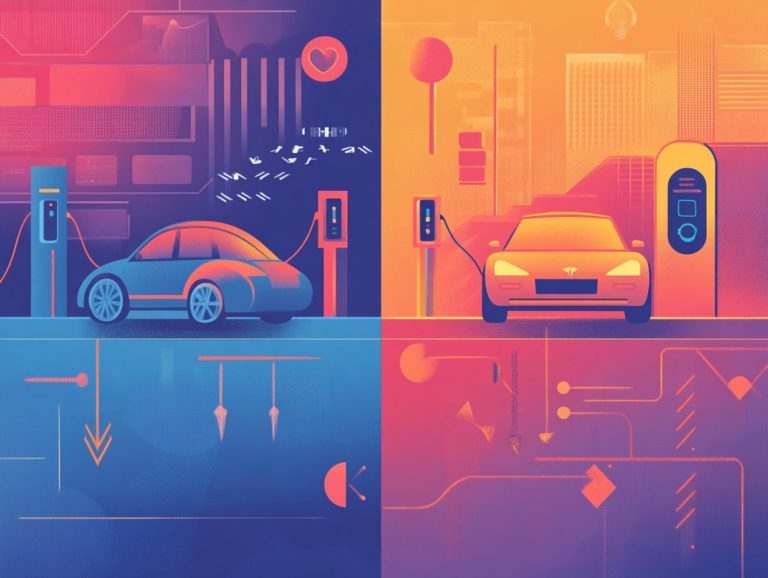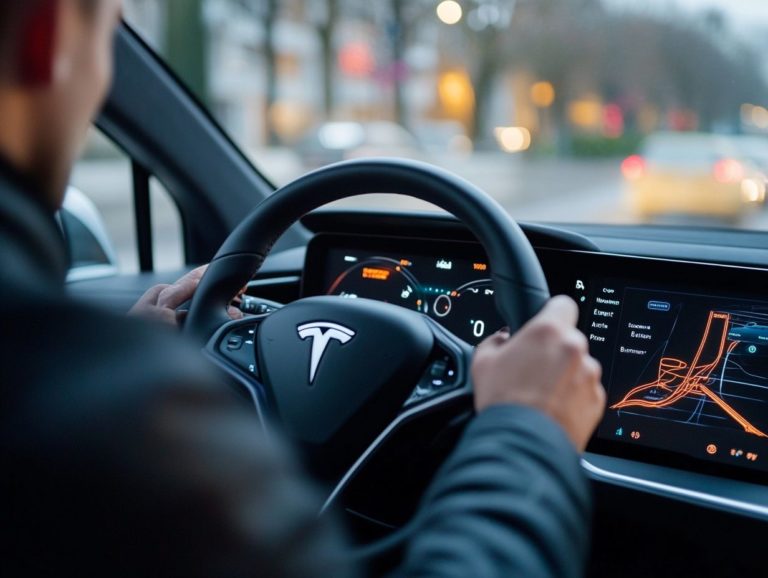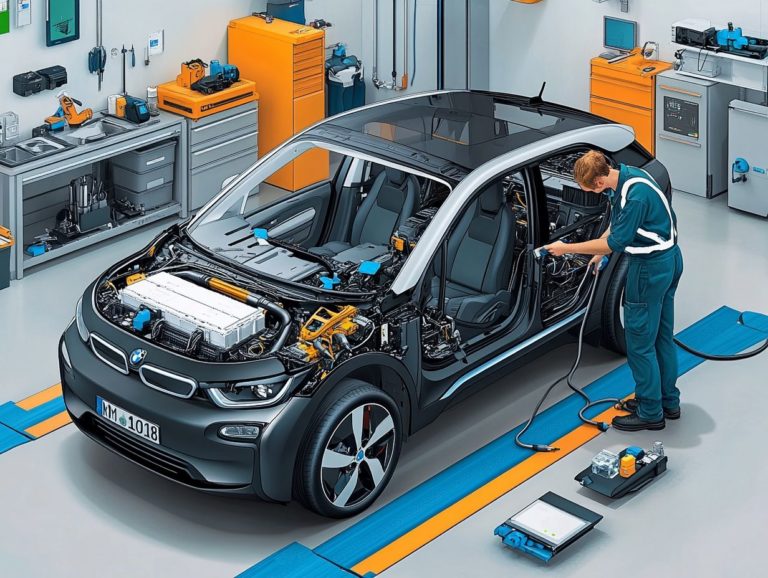what is the future of electric vehicles?
The world of transportation is experiencing a remarkable transformation with the rise of electric vehicles (EVs). From their modest origins to cutting-edge technology, EVs are revolutionizing not just your driving experience but also making significant impacts on the environment and the economy.
This article delves into their history, showcases the myriad benefits they offer, and examines the challenges that lie ahead, such as infrastructure improvements and advancements in battery technology.
You ll also discover government incentives, the automotive industry’s evolving response, and what the future may hold for electric vehicles. Prepare for an enlightening journey into the electric future!
Contents
- Key Takeaways:
- The Rise of Electric Vehicles
- Benefits of Electric Vehicles
- Challenges for Electric Vehicles
- The Future of Electric Vehicles
- Government Incentives and Policies
- Impact on the Automotive Industry
- Frequently Asked Questions
- What is the future of electric vehicles?
- What are the advantages of electric vehicles?
- Will electric vehicles become more affordable in the future?
- What challenges may hinder the growth of electric vehicles?
- Will electric vehicles completely replace gasoline-powered vehicles?
- What can individuals do to contribute to the growth of electric vehicles?
Key Takeaways:
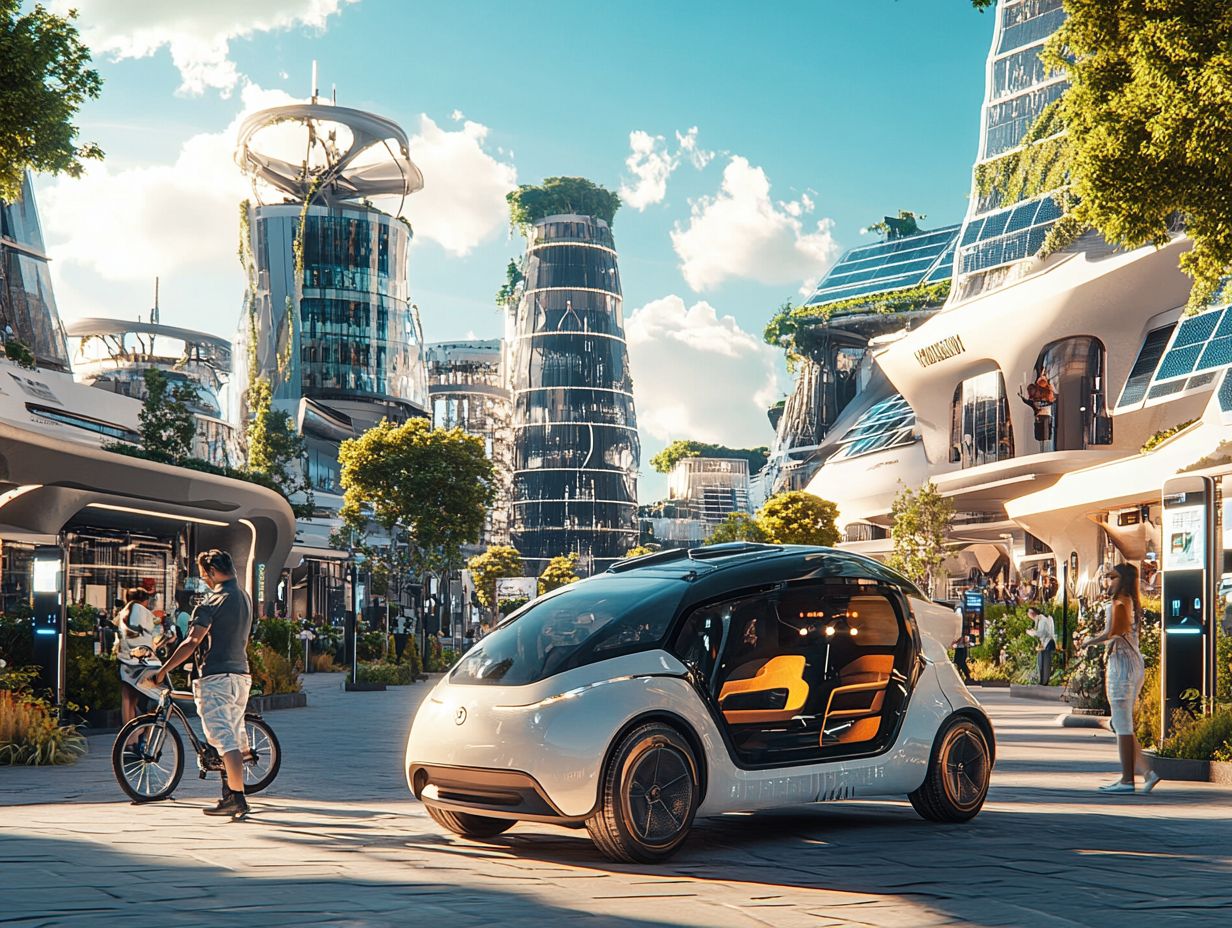
- Electric vehicles are on the rise, supported by advancements in technology and battery capabilities, making them a viable alternative to traditional gas-powered cars.
- EVs offer significant benefits, including reduced environmental impact and cost savings for consumers, making them an attractive option for individuals and businesses.
- The future of electric vehicles looks promising, with projected growth, ongoing innovations in infrastructure and battery technology, and supportive government policies.
The Rise of Electric Vehicles
The rise of electric vehicles (EVs) signifies a transformative era in the automotive landscape. It represents a substantial shift away from traditional car engines toward cleaner, more sustainable alternatives. This shift tackles big problems like climate change and emissions reduction!
Major global automakers, including DS Automobiles and General Motors, are making significant investments in electric cars. Supportive UK government policies and a rapidly improving charging infrastructure are fueling this growth.
This evolution is set to redefine your driving habits and the entire automotive industry, as the focus increasingly shifts toward battery electric vehicles (BEVs) and plug-in hybrids.
History and Evolution of Electric Cars
The history of electric cars traces back to the 19th century, but recent advancements driven by climate concerns and emissions regulations have dramatically accelerated their evolution.
Initially, electric vehicles were seen as novelties, limited in range and practicality. However, as the 21st century dawned, government bodies like the EPA and the International Energy Agency implemented strict regulations aimed at curbing greenhouse gas emissions.
This regulatory framework opened the floodgates for substantial investments in battery technology and renewable energy, elevating EVs as formidable alternatives to traditional gasoline-powered vehicles.
Consumers are increasingly captivated by the environmental advantages, as innovations like technology that helps recharge the battery while driving further enhance their appeal. This shift marks a significant move toward sustainable transportation solutions, and you’re right in the middle of it.
Benefits of Electric Vehicles
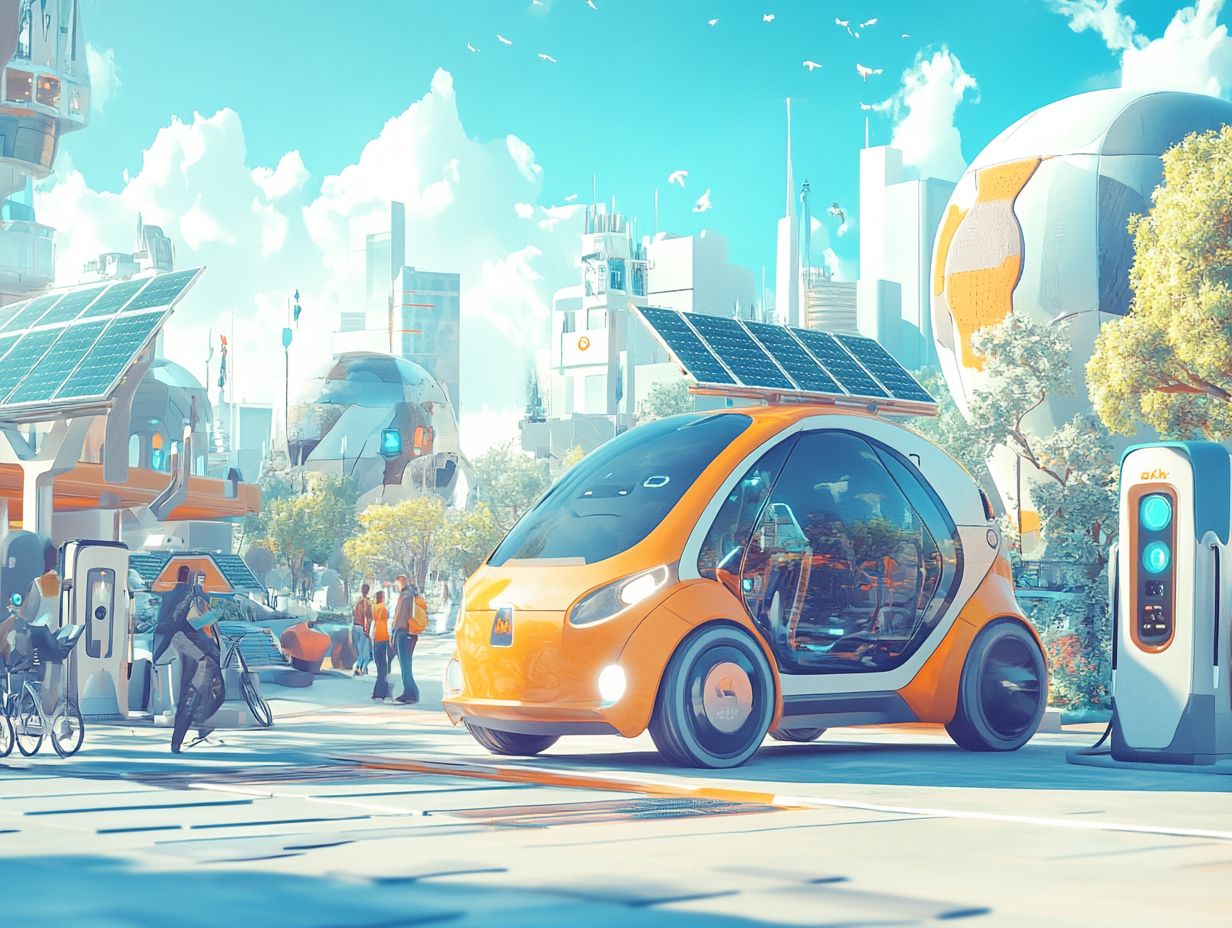
Electric vehicles present numerous advantages that go beyond simple transportation. They help reduce emissions, promote clean energy alternatives, and provide substantial cost savings for drivers over time.
Embrace the electric future and join the movement for a sustainable world!
Environmental Impact and Cost Savings
Electric vehicles have a remarkable environmental impact. They produce zero tailpipe emissions, helping to combat climate change and shift toward clean energy.
This shift significantly reduces carbon emissions. As a result, urban areas benefit from cleaner air and improved public health by minimizing harmful pollutants.
Studies show that cities with electric vehicles have better air quality. This directly contributes to fewer respiratory issues among residents.
You can t overlook the cost savings tied to electric transportation. The lower cost of electricity compared to gasoline, along with reduced maintenance expenses due to fewer moving parts, makes electric vehicles an economically savvy choice.
By embracing these advantages, individuals and communities can pave the way toward a more sustainable future.
Challenges for Electric Vehicles
Despite the numerous benefits of electric vehicles, several challenges can impede their widespread adoption.
Key issues revolve around charging infrastructure, battery technology, and the stiff competition posed by traditional gasoline cars.
Infrastructure and Battery Technology
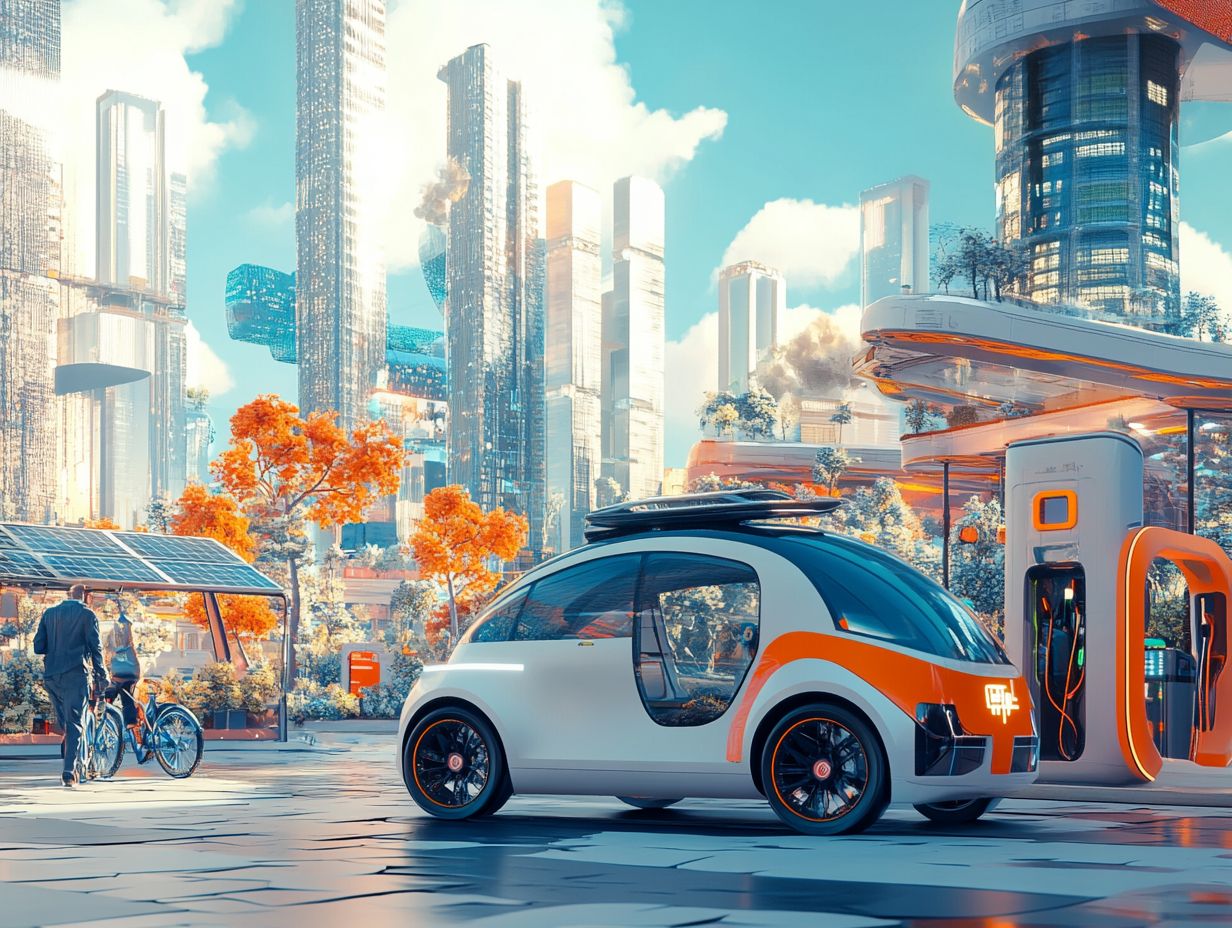
The success of electric vehicles heavily hinges on the evolution of charging infrastructure and battery technology. These are key factors that ensure adequate electric range and performance.
As the automotive industry accelerates its shift toward sustainability, these elements become essential for meeting rising consumer expectations.
Enhanced charging networks, featuring faster and more efficient stations, are crucial for alleviating any range anxiety.
Advances in battery technology significantly impact the development of high-capacity, long-lasting batteries. Vital materials like lithium, cobalt, and nickel are central to this progress.
Future innovations, such as solid-state batteries and advanced recycling techniques, promise to enhance performance while minimizing reliance on finite resources. This marks a pivotal step forward for the electric vehicle market.
The Future of Electric Vehicles
The future of electric vehicles is bright and full of exciting possibilities! Anticipated growth in sales and continuous innovations pave the way for greater acceptance within the automotive market.
The rise of hydrogen cars is emerging as a complementary technology, further enhancing the landscape of sustainable transportation.
Projected Growth and Innovations
Projected growth for electric vehicles showcases a promising trajectory. Ongoing technological innovations consistently enhance both electric range and affordability for consumers.
Recent forecasts from S&P Global Mobility reveal that the global electric vehicle market is set to experience a substantial surge. Sales could potentially double in the next few years.
This transformation is driven by several factors, including advancements in battery technology, the expansion of charging infrastructure, and growing environmental awareness among consumers.
Automakers are pouring significant resources into research and development. This results in state-of-the-art models that boast longer ranges and quicker charging times.
As these innovations emerge, you’ll want to stay ahead of the curve and be part of the electric vehicle revolution!
Government Incentives and Policies
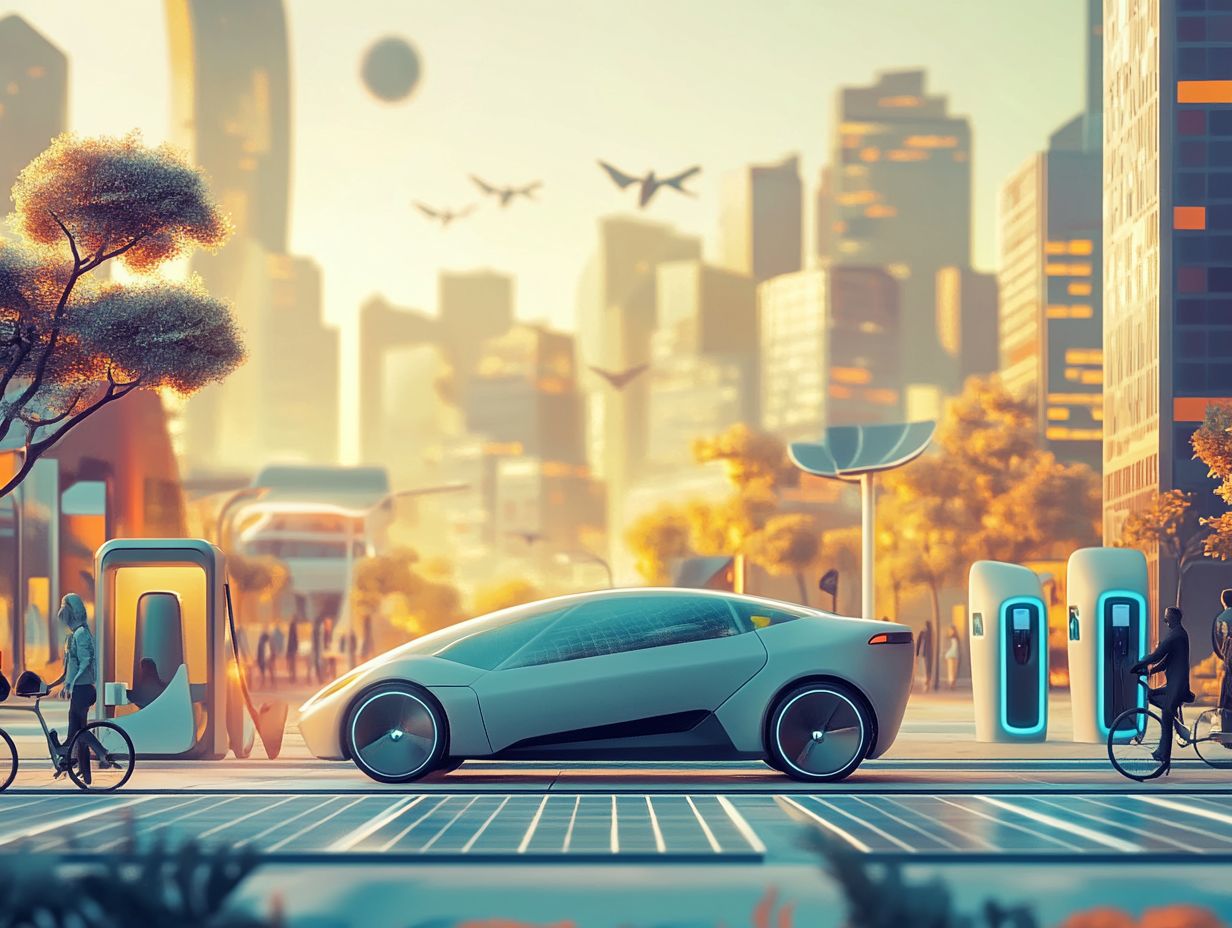
Government incentives and policies are paramount in driving the adoption of electric vehicles. Nations like the UK are implementing regulations designed to curb carbon emissions.
Understanding this dynamic can significantly enhance your perspective on the future of sustainable transportation.
Support for Electric Vehicle Adoption
Government initiatives support your journey to adopting electric vehicles. They show a commitment to transforming the automotive industry for sustainable mobility.
These initiatives offer financial incentives, including grants and rebates, to help you afford electric vehicles.
Investments in charging infrastructure enhance accessibility, making it easier to embrace the electric vehicle lifestyle.
By fostering a supportive environment for manufacturers and consumers, these efforts stimulate demand and build a strong electric vehicle ecosystem.
Impact on the Automotive Industry
The impact of electric vehicles on the automotive industry is transformative. They are reshaping manufacturing processes, altering sales strategies, and redefining consumer influence.
Changes in Manufacturing and Sales
Manufacturing processes and sales strategies in the automotive industry are increasingly influenced by the rise of electric vehicles and changing consumer behavior.
As sustainability becomes a priority, traditional automakers are re-evaluating production methods to adopt more environmentally friendly methods.
This shift involves investing in advanced technologies that boost efficiency and minimize waste while responding to new market demands.
The transition to electric vehicles compels manufacturers to rethink their sales approaches, emphasizing digital platforms and customer engagement strategies to connect effectively with eco-conscious consumers.
Collaborations with tech companies for battery development and energy management solutions are becoming standard, showcasing how the sector evolves to stay competitive.
Frequently Asked Questions
What is the future of electric vehicles?
The future of electric vehicles is exciting and full of potential as countries and companies invest in their use. With technological advancements and growing environmental awareness, electric vehicles are expected to become the primary mode of transportation.
What are the advantages of electric vehicles?
Electric vehicles offer lower emissions, reduced operating costs, and a smoother, quieter driving experience. They also have fewer mechanical parts, making maintenance easier and more affordable.
Will electric vehicles become more affordable in the future?
As technology improves and production scales up, the cost of electric vehicles is expected to decrease. Additionally, government incentives and subsidies will make them more accessible to the public.
What challenges may hinder the growth of electric vehicles?
Challenges for electric vehicles include limited charging infrastructure, range anxiety, and the high initial purchase cost. Efforts are underway to address these issues and enhance accessibility.
Will electric vehicles completely replace gasoline-powered vehicles?
While it’s hard to predict the exact future, electric vehicles are expected to become more dominant. However, gasoline-powered vehicles may still meet specific demands, such as heavy-duty trucks and long-distance transportation.
What can individuals do to contribute to the growth of electric vehicles?
Individuals can help by switching to electric vehicles themselves, educating others about their benefits, and supporting policies that encourage electric vehicle use and production.


